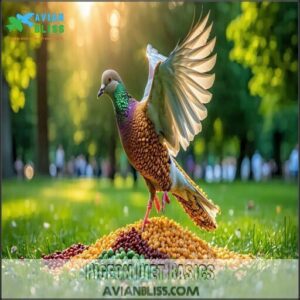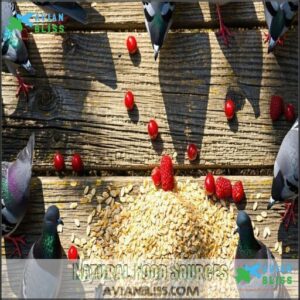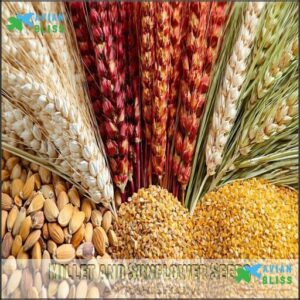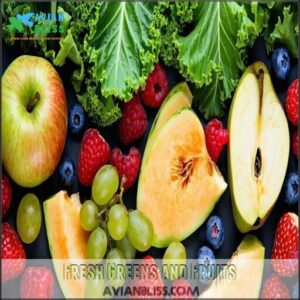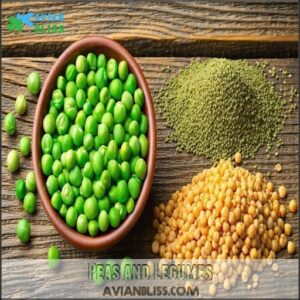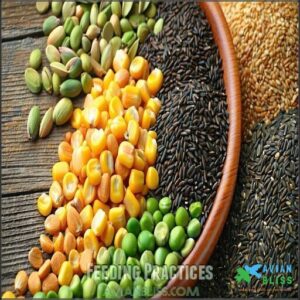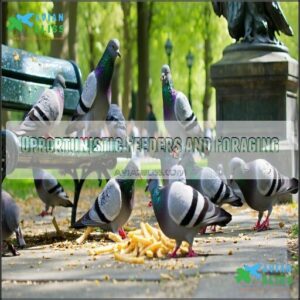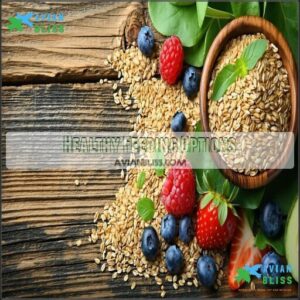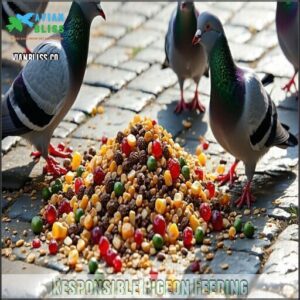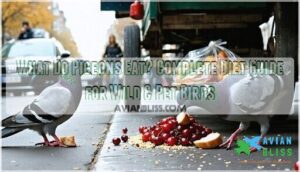This site is supported by our readers. We may earn a commission, at no cost to you, if you purchase through links.
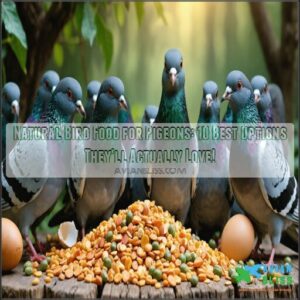
Feed them a mix of millet, barley, wheat, corn, peas, and sunflower seeds for complete nutrition. Add small amounts of chopped greens like kale or spinach occasionally.
Always provide fresh water and calcium sources like crushed eggshells. Unlike commercial mixes, natural options contain no preservatives or artificial ingredients that could harm your feathered friends over time.
Most pigeons thrive on a simple seed mix containing 12-14% protein. The right natural diet supports healthy plumage, digestion, and immune function—just like nature intended.
Table Of Contents
- Key Takeaways
- Pigeon Diet Basics
- Natural Food Sources
- Essential Nutrients
- Safe Foods for Pigeons
- Foods to Avoid
- Top 8 Natural Bird Foods
- Feeding Practices
- Pigeon Feeding Behavior
- Healthy Feeding Options
- Responsible Pigeon Feeding
- Frequently Asked Questions (FAQs)
- What natural food do pigeons eat?
- How to make homemade pigeon feed?
- What is a superfood for pigeons?
- What bird food is good for pigeons?
- Can pigeons eat sprouted seeds?
- How does seasonal availability affect pigeon diet?
- Do urban and rural pigeons eat differently?
- When should I switch juvenile pigeons to adult food?
- Can pigeons develop food preferences or favorites?
- Conclusion
Key Takeaways
- You’ll support optimal pigeon health by providing a mix of seeds and grains (millet, barley, wheat, corn) that mirrors their natural diet, aiming for 12-14% protein content to maintain healthy plumage and immune function.
- You can supplement your pigeon’s diet with chopped fresh greens, small amounts of fruits, and legumes like peas to provide essential vitamins and minerals that aren’t always present in seed mixes.
- You’ll need to maintain a calcium-to-phosphorus ratio of 2:1 by offering crushed eggshells or specialized pigeon grit, which also helps birds digest seeds in their gizzard since they lack teeth.
- You should avoid feeding pigeons processed foods, salty snacks, avocados, chocolate, onions, and garlic, as these can cause serious health issues ranging from sodium toxicity to fatal organ damage.
Pigeon Diet Basics
You’ll need to understand the natural dietary needs of pigeons, which primarily consume seeds and grains while adapting to available food sources in their environment.
Your feathered friends require a balanced intake of proteins for muscle development, carbohydrates for energy, and essential vitamins and minerals to maintain peak health.
Granivores and Opportunistic Feeders
Understanding pigeons’ eating habits is essential for providing proper nutrition. Pigeons are primarily granivores, meaning their diet centers around seeds and grains.
However, they’re also opportunistic feeders with remarkable dietary adaptations. In urban environments, you’ll notice pigeons:
- Consuming scattered breadcrumbs in parks
- Foraging for dropped food near outdoor cafés
- Pecking at seasonal fruits from trees
- Occasionally eating small insects for protein
Their nutritional scavenging abilities help them thrive across diverse environments, making them highly adaptable to different settings with diverse environments.
Digestive System and Nutritional Requirements
While pigeons may appear simple, their digestive system is quite remarkable.
Their digestive system, powered by a hardworking gizzard, efficiently processes seeds with the help of essential grit for optimal nutrition.
Their gizzard functions as a grinding mill, requiring grit to process seeds and grains efficiently.
Pigeons need 12-18% crude protein in their diet and about 5g of digestible proteins daily.
Water intake directly affects nutrient absorption.
For ideal pigeon health, provide a balanced mix of carbohydrates, proteins, and fats with approximately 12 MJ/kg of metabolizable energy.
Natural Food Sources
In the wild, pigeons naturally consume a variety of seeds, grains, fruits, and occasional protein sources that provide essential nutrients for their health.
You’ll find these birds foraging for millet, wheat, berries, and insects, which together form the foundation of their nutritional requirements in natural environments, including seeds.
Seeds and Grains
Most pigeons rely on seeds and grains as their dietary foundation.
In the wild, they consume a diverse seed variety including millet, sorghum, wheat, and corn.
These whole grains provide essential carbohydrates for energy.
Quality grain sources should be fresh and free from mold.
Consider offering sprouted grains occasionally, as they’re more digestible and nutritionally dense.
For ideal health, store organic seeds properly in cool, dry conditions to prevent rancidity.
Fruits and Vegetables
Many wild pigeons supplement their natural diet with various fruits and vegetables.
While seeds form their staple food, pigeons benefit from leafy greens like kale and spinach, which provide essential vitamins.
When offering safe vegetables, always chop them finely for easier consumption. Fruits should be given in moderation as part of a balanced pigeon diet.
Avoid toxic fruits like avocado that can harm your birds.
Fresh, organic produce mirrors their natural foraging habits, providing a healthy alternative to processed foods, and can be a key part of a natural diet that includes essential vitamins.
Proteins and Fats
In terms of proteins and fats in your pigeon’s diet, balance is essential.
Pigeons require quality protein sources like legume options (lentils and peas) for muscle development and feather maintenance.
Fats provide concentrated energy, found in seed variety such as sunflower and safflower seeds.
For ideal energy balance, incorporate a pigeon food mix with diverse pigeon feed ingredients, including high protein pigeon feed options like Mycelium Pigeon Protein that offer organic nutrition, supporting overall health.
Essential Nutrients
You’ll need to provide your pigeons with key nutrients including vitamins, minerals, calcium, and phosphorus for peak health and development.
These essential components support everything from bone strength to feather quality, directly impacting your bird’s immune system and overall lifespan.
Vitamins and Minerals
Most seed mixes lack five essential vitamins and minerals your pigeons need for peak health.
Commercial pigeon food mix often fails to provide adequate calcium and vitamin A, while vitamin D3 deficiency causes long-term bone health problems.
- Vitamin A supports vision and immune function
- B vitamins are critical for metabolic function and energy production
- Vitamin E acts as an antioxidant for muscle support
Add quality pigeon supplements to prevent mineral deficiencies and maintain healthy birds.
Grit and Water
The essential grit-water combination forms the foundation of proper pigeon digestion.
Grit types like crushed oyster shells serve as digestion aids, helping birds grind seeds in their gizzards since they lack teeth.
Water quality directly impacts hydration needs—pigeons require fresh, clean water daily.
When selecting mineral supplements, choose specialized pigeon grit containing calcium and other mineral sources to support overall health.
Calcium and Phosphorus
Your pigeon’s bone development depends on the right mineral ratios in their diet.
Calcium and phosphorus work together—calcium builds strong bones while phosphorus helps metabolize proteins.
For ideal pigeon nutrition, maintain a calcium-to-phosphorus ratio of 2:1.
Watch for deficiency symptoms like soft-shelled eggs or weak legs.
Good calcium sources include cuttlebone, crushed oyster shells, and specialized pigeon grit containing limestone.
Birds also need vitamin D for bone health, which is essential for bone health and helps with strong bones and metabolize proteins.
Safe Foods for Pigeons
You’ll find that pigeons thrive on a diet of natural seeds, grains, and occasional fruits and vegetables that provide essential nutrients for their health.
When feeding your feathered friends, it’s important to choose options like millet, sunflower seeds, chopped greens, peas, and small amounts of berries that mimic their natural foraging diet in the wild, including essential nutrients.
Millet and Sunflower Seeds
Vitamins and minerals support your pigeon’s health, and proper seed selection builds on this foundation.
Millet and sunflower seeds form the cornerstone of quality pigeon food.
Three popular millet varieties that pigeons love:
- White proso millet – easily digestible and energy-rich
- Red millet – higher in protein content
- Foxtail millet – excellent for variety in pigeon feed
Balance sunflower seeds at 10-15% of total feed due to their higher fat content, which is crucial for maintaining a balanced diet and ensuring the pigeons receive the necessary nutrients for optimal health, including the right amount of energy-rich food.
Fresh Greens and Fruits
Fresh greens and fruits provide essential nutrients that complement a pigeon’s seed-based diet.
You’ll want to offer these foods in moderation due to their higher water and sugar content.
| Greens | Benefits | Fruits | Benefits | Serving Size |
|---|---|---|---|---|
| Kale | High calcium | Apple | Vitamin C | Small pieces |
| Spinach | Iron-rich | Berries | Antioxidants | Few daily |
| Dandelion | Digestive aid | Grapes | Hydration | 2-3 halved |
| Romaine | Vitamin A | Melon | Hydration | Tiny cubes |
| Broccoli | Fiber source | Pear | Low sugar | Small chunks |
Reorganizing the diet to include a variety of fresh greens and fruits can be beneficial for pigeons, as it provides a range of vitamin and mineral sources.
Peas and Legumes
While fresh fruits and greens offer essential nutrients, peas and legumes are powerhouses of plant-based protein for your feathered friends.
These nutritious options provide excellent supplementation to your pigeon’s diet.
- Defrosted green peas serve as perfect training treats and protein sources
- Cooked lentils offer essential amino acids that support feather health
- Chickpeas (garbanzo beans) must be thoroughly cooked and cooled before feeding
- Sprouted legumes increase nutrient bioavailability and digestibility
Always introduce new legume varieties gradually to your pigeon feed, monitoring how they respond to each addition, to ensure a smooth transition and maintain the health of your pigeons, with proper nutrition.
Foods to Avoid
While you’re providing your feathered friends with nutritious options, you’ll need to know which foods can harm them.
Certain items like salty snacks, processed foods, avocados, and chocolate, and foods with large pits contain compounds that can damage pigeons’ digestive systems and potentially cause severe health issues.
Salty and Processed Foods
Three common household items can cause serious harm to pigeons: salty and processed foods.
These products contain harmful additives that lead to sodium toxicity and kidney damage in birds.
Foods like chips, crackers, and processed meats lack essential nutrients, contributing to nutritional deficiencies and obesity risks.
Unlike natural seed mixes, these harmful foods can devastate a pigeon’s delicate digestive system, with even small amounts potentially causing lasting damage.
Toxic Fruits and Vegetables
While you’ve protected your pigeons from salty snacks, don’t overlook harmful plant foods.
Avocado toxicity is real—persin in avocados can be fatal to birds.
Onions and garlic cause dangerous anemia and ulcers.
Remember to remove seeds from apples and other fruits, as they contain cyanide compounds that affect the heart.
Large amounts of citrus can irritate birds’ digestive systems, and chocolate is absolutely deadly to your feathered friends.
Top 8 Natural Bird Foods
You’ll find these eight natural food options provide ideal nutrition that meets your pigeon’s dietary requirements without artificial additives or preservatives.
Each product contains a specific blend of seeds, grains, and essential nutrients that support healthy growth, feather development, and digestive function in domestic and wild pigeons, which is crucial for their overall development.
1. Hagen Pigeon Dove Seed Bird Food
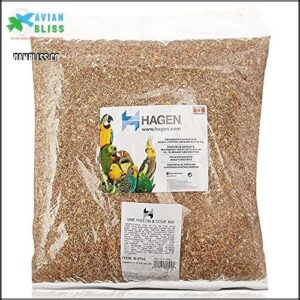
Hagen Pigeon Dove Seed Bird Food stands out from the crowd with its premium blend of nutritionally complete ingredients.
A premium blend of air-cleaned seeds enriched with essential nutrients, perfect for keeping pigeons healthy and satisfied.
This high-quality mix contains white millet, red milo, wheat, cracked corn, and safflower seeds—all air-cleaned and polished for a dust-free feeding experience.
Your birds will benefit from essential vitamins and minerals supplemented throughout the 25-pound bag, and many bird owners report their pigeons prefer this mix over competitors, resulting in less waste.
For maximum freshness, store the opened bag in your refrigerator, as the vacuum-sealed packaging helps maintain seed quality during shipping and storage, ensuring the high-quality mix remains effective.
Best For: Bird owners and enthusiasts looking for a nutritionally complete, high-quality seed mix for pigeons and doves.
- Nutritionally enriched with essential vitamins and minerals.
- Dust-free, air-cleaned, and polished seeds for easy feeding.
- Attracts a variety of birds and minimizes seed waste.
- Risk of damaged bags during shipping causing seed spillage.
- Pricier compared to alternative brands.
- Requires refrigeration after opening for optimal freshness.
2. Hagen Pigeon Dove Seed Food
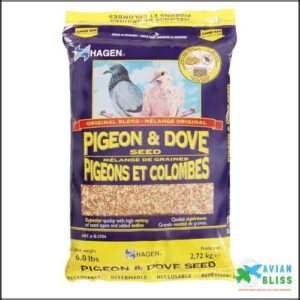
You’ll find that Hagen Pigeon Dove Seed Food stands out with its high-quality seed blend specifically designed for ideal pigeon nutrition.
This 6-pound bag contains air-cleaned, polished seeds enriched with essential vitamins and minerals. The zipper bag packaging maintains freshness and prevents insect infestation.
With minimum 11% crude protein and 5% crude fat, it provides balanced nutrition for both wild and captive birds.
Remember to supply fresh water alongside this feed and remove uneaten portions regularly.
While some users note it’s pricier than alternatives, the quality ingredients including millet, hemp seed, and cracked corn justify the cost.
Best For: Owners of wild or captive pigeons and doves seeking a high-quality, nutritionally balanced seed blend.
- Enriched with essential vitamins and minerals for balanced health.
- Zipper bag and air-tight packaging keep seeds fresh and prevent infestation.
- High-quality blend includes millet, hemp seed, and cracked corn.
- Considered expensive compared to other pigeon food options.
- Some birds may prefer seeds in smaller sizes.
- Requires careful storage and refrigeration after opening to maintain freshness.
3. Morning Song Dove and Ground Food
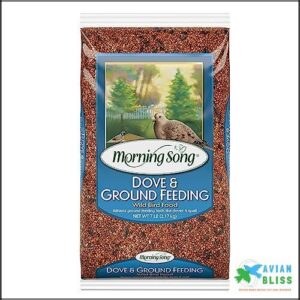
Why do ground-feeding birds flock to Morning Song Dove and Ground Food? This specialized blend contains red milo, white millet, and black oil sunflower seeds in a ground formulation that’s perfect for doves, quail, sparrows, and juncos.
The 7-pound bag offers excellent value, attracting up to 20 mourning doves at once. You can use it in table feeders or sprinkle directly on the ground in small amounts.
For best results, place feeders near trees or shrubs, at least five feet above ground. Regular cleaning of feeding areas prevents debris buildup and discourages unwanted pests, ensuring a healthy environment for the birds, with proper placement and regular cleaning being key to success.
Best For: Bird enthusiasts looking to attract ground-feeding birds like doves, quail, sparrows, and juncos with a specialized seed blend.
- Attracts a variety of ground-feeding birds, including mourning doves and juncos.
- Easy to use with table feeders or for sprinkling directly on the ground.
- Large 7-pound bag offers good value for frequent use.
- Not the most nutritious option for birds.
- Frequent feeding can lead to high consumption rates and require regular restocking.
- Requires consistent cleaning to avoid debris buildup and pests.
4. Morning Bird Pigeon Grit Natural Food
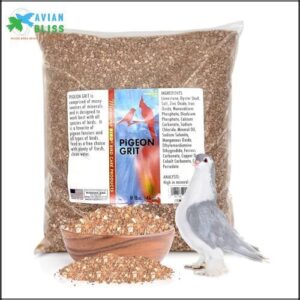
Morning Bird Pigeon Grit Natural Food serves as an essential mineral supplement for your feathered friends.
Made in Morgan Hill, California, this granule formula supports muscle and bone health while aiding digestion.
Available in sizes from 1.5 to 18 pounds, it contains limestone, oyster shell, and various minerals like zinc and iron oxide.
Customers report their pigeons and doves enjoy this product, with many noting improved health in rescued birds, and for best results, offer it as a free choice alongside fresh water.
Store in a cool, dry place to maintain quality.
Best For: Bird owners and caregivers seeking a high-quality, mineral-rich supplement for all life stages, including rescued or recovering pigeons and doves.
- Packed with essential minerals for bird health and vitality.
- Suitable for all bird life stages, including pigeons and doves.
- Locally sourced and made in the USA with consistent quality.
- Some customers noted size inconsistencies between purchases.
- Not suitable for use as a primary food source.
- Requires proper storage to maintain freshness.
5. Harrison’s Adult Lifetime Fine Organic Bird Food
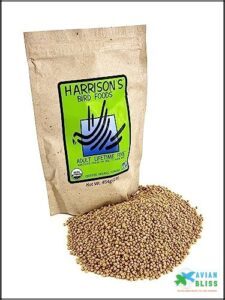
With certification as organic and non-GMO, Harrison’s Adult Lifetime Fine Organic Bird Food offers excellent nutrition for pigeons.
Formulated by avian nutritionists and veterinarians, this maintenance formula contains whole grains and legumes with naturally occurring vitamins and minerals.
The pellets provide minimum 14% crude protein and 5.5% crude fat, with balanced omega fatty acids for healthy plumage.
You can serve it dry or slightly moistened, making up 70% of your pigeon’s diet, which comes in a convenient resealable bag for freshness.
Users report improved bird health and vibrancy after switching to this food.
Best For: Small to medium non-breeding birds like pigeons, cockatiels, and lovebirds needing a certified organic maintenance diet.
- Certified organic and non-GMO with premium whole grains.
- Balanced omega fatty acids promote healthy plumage.
- Convenient resealable bag maintains freshness.
- Pellet size may not suit smaller birds like parakeets.
- Requires 70% of the diet, needing additional foods for balance.
- Higher cost compared to seed-based diets.
6. Premium Pigeon Food Seed Mix
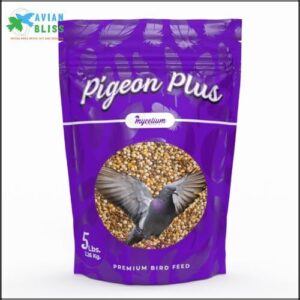
Many pigeon enthusiasts swear by this premium seed mix that combines Canadian peas, milo, popcorn, wheat, and safflower.
The 5-pound bags contain a clean, debris-free blend that’s 100% edible, making it cost-effective despite the $5 per pound price tag.
This high-energy formula supports feather health during molting with omega-rich ingredients and enhances digestion through natural fiber content.
Your birds will appreciate the sustainable, non-GMO ingredients sourced from American family farms.
Users report their pigeons show a strong preference for this mix, with notable improvements in overall health and vigor.
Best For: Pigeon enthusiasts seeking a high-energy, nutritious, and sustainable seed mix for optimal bird health and performance.
- Clean, 100% edible, debris-free blend.
- Supports feather health and digestion with omega-rich and fiber-rich ingredients.
- Sustainably sourced, non-GMO ingredients from American family farms.
- Higher cost at $5 per pound may deter budget-conscious buyers.
- Limited packaging options, only available in 5-pound bags.
- Transitioning pigeons from millet-based diets can be challenging.
7. Dove Food Premium Nut Free Seed
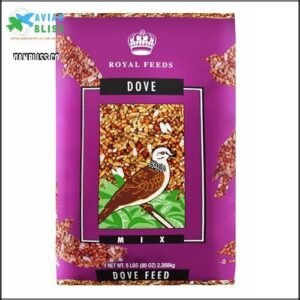
This premium nut-free seed mix offers an ideal solution for pigeon and dove owners concerned about allergens.
Packaged in a 5-pound bag, it contains a carefully balanced blend of safflower, wheat, millet, and milo without peanuts, tree nuts, fillers, or GMOs.
The mix supports daily energy needs and promotes natural foraging behavior while maintaining digestive health.
Produced in a dedicated allergen-free facility by Leach Grain & Milling Co., a family-owned business with nearly a century of experience, this formula provides essential carbohydrates and proteins for strong feathers and overall well-being, supporting daily energy needs.
Best For: Dove and pigeon owners or bird enthusiasts seeking a premium nut-free seed mix to support healthy diets and natural foraging behavior.
- Nut-free, allergen-free formula safe for sensitive birds.
- High-quality seeds like millet and safflower promote strong feathers and vitality.
- Versatile for backyard feeding stations, platform feeders, or aviaries.
- Limited to a 5-pound bag size, which may not suit larger-scale feeding needs.
- Shipping wait times may be inconvenient for some customers.
- May not appeal to birds accustomed to sunflower seeds or alternative seed blends.
8. Mycelium Organic Pigeon and Bird Food
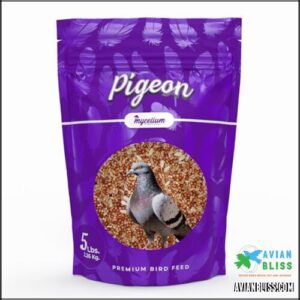
Why settle for ordinary bird food when Mycelium Organic Pigeon Food offers exceptional nutrition?
This high-protein blend features milo, wheat, millet, and safflower—all organic and non-GMO.
The formula is specifically designed for ground-feeding birds, making it perfect for pigeons.
You’ll appreciate the no-waste processing that removes broken seeds and debris.
Available in a convenient 5-pound pack, this food supports feather quality and overall health year-round.
Your pigeons will quickly show their approval by enthusiastically consuming every seed.
Store it in a cool, dry place to maintain its nutritional value.
Best For: Ground-feeding pigeon owners seeking a high-quality, organic, and nutritious seed blend.
- Higher price point compared to standard bird food
- Limited size option (only available in a 5-pound pack)
- Specific to ground-feeding birds, not ideal for all bird types
- Organic, non-GMO ingredients free of synthetic pesticides and additives
- No-waste formula for clean feeding and reduced mess
- Suitable for year-round feeding, supporting health and feather quality
Feeding Practices
You’ll need to establish consistent feeding routines for your pigeons, offering a balanced mix of seeds, grains, and fresh vegetables in clean containers once daily.
Providing fresh water at all times and monitoring your birds’ eating habits will help you identify potential health issues early, ensuring your pigeons maintain peak nutrition.
Balanced Diet and Fresh Water
Now that you’ve explored natural bird food options, let’s look at keeping your pigeons properly nourished.
A balanced diet for pigeons combines various seed types in proper nutrient ratios with dietary variety.
Provide fresh water daily, as hydration importance can’t be overstated.
Water quality directly impacts pigeon health, so clean containers regularly.
Your pigeon’s natural diet should include supplements when needed, especially during molting or breeding seasons.
Avoiding Overfeeding and Using Proper Containers
Keeping pigeons from overindulging requires strict portion control in your feeding routine. Limit seeds to 1-2 tablespoons per bird daily to prevent obesity.
Choose shallow, wide containers that accommodate pigeon feeding behavior while minimizing waste reduction. Consider shallow feeders for pigeons to help prevent overcrowding.
Clean feeders thoroughly weekly to maintain proper feeder hygiene. Different container types work well—ceramic dishes or platform feeders prevent contamination.
Watch for behavioral cues like excessive droppings or leftover food, indicating your pigeon diet needs adjustment, and ensure regular adjustments to maintain a healthy diet.
Observing Eating Habits
While using proper containers, don’t forget to watch your pigeons’ feeding habits – they’ll tell you a lot about their health.
Observe these key behaviors when pigeons eat:
- Healthy pigeons eat with enthusiasm, finishing portions quickly
- Disinterest in food often indicates illness or nutritional deficiencies
- Changes in food preferences may signal dietary imbalances
This observation helps adjust portion control and identify health indicators early, especially in urban pigeons whose foraging behavior differs from rural counterparts. Observing their actions can highlight their territorial and courtship behaviors, which is crucial for understanding their behavior and overall wellbeing.
Pigeon Feeding Behavior
You’ll notice that pigeons follow consistent patterns when searching for food, typically foraging throughout the day and eating approximately one-tenth of their body weight daily.
They’re social eaters that gather in groups around food sources, which helps them locate nourishment more efficiently and provides protection from predators while feeding.
Opportunistic Feeders and Foraging
Adaptability defines a pigeon’s survival strategy. These birds are true opportunistic feeders, adjusting their foraging habits based on food availability in their environment.
| Foraging Behavior | Urban Setting | Rural Setting |
|---|---|---|
| Food Sources | Discarded human food, bird feeders | Wild seeds, grains, insects |
| Feeding Time | Throughout day, peaks at morning/evening | Dawn and dusk primarily |
| Techniques | Ground pecking, following humans | Field scanning, crop raiding |
| Seasonal Changes | Less selective in winter | More diverse diet in summer |
You’ll notice urban pigeons demonstrate remarkable scavenging behavior, collecting whatever nutrition they can find. They are opportunistic feeders, and their ability to adapt is key to their survival in various environments, making them successful in both urban and rural settings.
Social Interaction and Aggression
While pigeons forage, watch for their social dynamics at feeding sites.
Dominance hierarchies play a key role in food competition, with higher-ranked pigeons gaining first access.
Urban pigeons display aggression when their personal space is invaded, especially during feeding.
You’ll notice males performing driving behaviors when approached, often motivated by protecting mates.
Flock dynamics shift with population density – overcrowded feeding areas increase mating displays and urban aggression among hungry birds.
Feeding Times and Locations
Feeding times for pigeons aren’t rigid—they’ll forage all day, especially in urban environments. Public feeding can disrupt natural foraging habits, so stick to pigeon feeding guidelines.
Seasonal variations may affect their behavior, too. Seasonal changes can also affect feeding locations.
- Feed early morning or late afternoon.
- Scatter food to mimic natural foraging.
- Avoid crowded public spaces.
- Observe pigeon feeding habits for ideal frequency to ensure you’re not disrupting their behavior.
Healthy Feeding Options
You’ll improve your pigeon’s health by offering natural foods like millet, sunflower seeds, leafy greens, and fresh fruits instead of commercial mixes alone.
A balanced diet combining supplementary grains with vegetables provides essential nutrients that support ideal feather quality, immune function, and digestive health.
Supplementary Grains and Seeds
Now that you understand how pigeons naturally forage, let’s examine the supplementary grains and seeds you can offer for ideal nutrition.
| Seed Type | Nutritional Value | Serving Suggestion |
|---|---|---|
| Sunflower seeds | High in fat and protein | 10-15% of diet |
| Safflower seeds | Rich in essential oils | 5-10% of diet |
| Millet | Good carbohydrate source | 20-30% of diet |
Store seeds in airtight containers to maintain freshness. Some suppliers offer bulk seed options for pigeon enthusiasts.
Consider organic options and occasionally offer sprouting seeds for enhanced nutritional balance.
Fresh Fruits and Vegetables
Your feathered friends will benefit from fresh greens and colorful fruits as part of their pigeon diet.
Leafy vegetables like kale and spinach provide essential vitamin sources and mineral content. Safe vegetables include chopped carrots, peas, and cucumber.
Offer fruits in moderation—small pieces of apple, berries, and melon make excellent organic options. Some owners provide specific greens for pigeons to ensure a varied diet.
Remember that fresh produce should complement, not replace, quality pigeon feed.
Responsible Pigeon Feeding
You’ll protect pigeon populations and their natural environment by offering appropriate amounts of nutritious food in designated areas.
When you provide balanced nutrition and maintain clean feeding sites, you’re supporting both the birds’ health and your community’s well-being.
Promoting Natural Foraging
Encouraging foraging benefits urban pigeons by mimicking their wild diet and supporting natural instincts.
Try scatter feeding to promote natural behavior, spreading seeds or grains over a safe area.
This approach limits dependence on humans while enriching their feeding behavior.
A varied pigeon diet with natural bird food guarantees healthier birds, blending instinctive practices with balanced nutrition.
Avoiding Harmful Practices
Why do pigeons suffer when we feed them the wrong foods?
Salt toxicity occurs when pigeons consume salty snacks, disrupting their water balance. Avoid toxic foods like chocolate, alcohol, and avocados.
Never offer dairy products, as pigeons can’t digest lactose. Discard moldy food immediately—it contains harmful toxins.
Be cautious with toxic plants near feeding areas. Overfeeding risks include dependency and population imbalances that harm both pigeons and urban environments, leading to salt toxicity and dependency.
Educating Others on Responsible Feeding
After learning what not to do, sharing knowledge with others is just as valuable. Public awareness about pigeon feeding responsibility creates healthier bird populations in our communities.
Feeding pigeons can foster a sense of purpose for some individuals.
Here’s how to educate others on responsible pigeon feeding:
- Share simple pigeon diet facts with interested neighbors
- Demonstrate safe scattering techniques that promote natural foraging
- Explain the cleanliness importance of removing uneaten food
- Discuss dependence avoidance by feeding smaller amounts
- Distribute information about urban pigeons at community events
Frequently Asked Questions (FAQs)
What natural food do pigeons eat?
In their natural habitat, pigeons primarily eat seeds, grains, and berries they find while foraging. They’ll also consume fruits, leafy greens, and occasionally small insects or snails for additional protein.
How to make homemade pigeon feed?
Mix whole grains (wheat, barley), seeds (millet, sunflower), legumes (split peas, lentils), and crushed oyster shells in a 60-30-10 ratio.
You’ll provide balanced nutrition while saving money on commercial feeds.
What is a superfood for pigeons?
Seeds nourish, greens revitalize, and legumes strengthen your pigeons naturally.
Flaxseeds are truly a superfood for pigeons, providing essential omega-3 fatty acids that support heart health, immune function, and promote glossy feathers.
What bird food is good for pigeons?
You’ll find pigeons thrive on commercial pigeon feed with corn, wheat, and barley.
They also enjoy seeds like millet and safflower, plus fresh greens, peas, and small amounts of chopped fruits for balanced nutrition.
Can pigeons eat sprouted seeds?
Want to boost your pigeon’s nutrition?
Yes, pigeons can eat sprouted seeds.
They’re highly nutritional, easier to digest, and contain more vitamins than dry seeds.
You’ll find they’re an excellent addition to their diet.
How does seasonal availability affect pigeon diet?
Seasonal changes shape what pigeons eat.
In spring and summer, they enjoy fresh greens and insects, while fall brings seeds and fruits.
Winter limits options, often relying on stored seeds or human-provided food.
Do urban and rural pigeons eat differently?
You’d think city pigeons attended fine dining schools!
Urban pigeons rely heavily on human food scraps and processed items, while their country cousins maintain a more natural diet of seeds, grains, and wild fruits.
When should I switch juvenile pigeons to adult food?
You should switch juvenile pigeons to adult food gradually between 6-8 weeks of age.
Their digestive system becomes fully developed around this time, allowing them to process the more varied adult diet.
Can pigeons develop food preferences or favorites?
Yes, pigeons do develop food preferences.
They’ll often show clear favorites among seeds, grains, and fruits.
You’ll notice them selectively picking out preferred items first when presented with a varied diet.
Conclusion
Just like feeding a child balanced meals, providing natural bird food for pigeons leads to vibrant, healthy birds.
You’ll see improved feather quality, better digestion, and fewer health issues when you stick to seeds, grains, and occasional fruits.
Remember to include calcium sources and fresh water daily, by choosing natural options over commercial mixes with additives, you’re giving these resilient birds what they truly need.
Your pigeons will thank you with energy and longevity!

